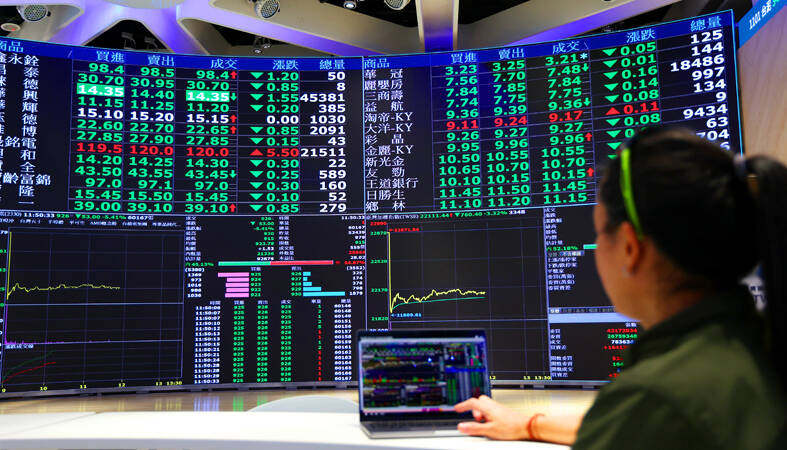Taiwan Semiconductor Manufacturing Co (TSMC, 台積電) shares fell the most in three months yesterday upon trading resumption, joining a global technology rout as investors dramatically soured on the promises of artificial intelligence (AI).
The shares declined 5.62 percent to close at NT$924 in Taipei, dragging down the benchmark TAIEX, which fell 3.29 percent to 22,119.21 points amid a technical correction, Taiwan Stock Exchange data showed.
Other chip stocks also fell, with ASE Technology Holding Co (日月光投控) plunging 9.86 percent, MediaTek Inc (聯發科) dropping 2.35 percent, Realtek Semiconductor Corp (瑞昱) falling 1.33 percent and United Microelectronics Corp (聯電) retreating 1.17 percent, while Apple Inc manufacturing partner Hon Hai Precision Industry Co (鴻海精密) slumped 4.71 percent.

Photo: CNA
Local markets reopened after a two-day closure due to Typhoon Gaemi.
Lackluster earnings from US technology firms have set off a reckoning on the AI hype.
The latest technology rout adds further pressure on TSMC, whose record-breaking rally has been faltering since the middle of this month. A favored AI play due to its cutting-edge chips and stellar earnings, concern over a pricey valuation and the risk of tighter US curbs on chip sales to China have poured cold water on the bullish momentum.
The rotation out of valuation-stretched technology names has been “exacerbated by weak results from ‘Magnificent Seven’ titans Alphabet Inc and Tesla Inc, and some negative news flow on China tariffs,” Union Bancaire Privee SA managing director Ling Vey-sern (凌煒森) said. “Whether the tech sell-off will continue will depend on key results next week which will see four of the Magnificent Seven stocks report,” such as Apple and Amazon.com Inc.
TSMC shares have now fallen more than 14 percent from their peak. The decline spells trouble for the local financial market given the stock accounts for more than one-third of TAIEX’s weighting.
The change of fortunes for Taiwan’s shares has been swift. Earlier this year, surging interest in AI shares had triggered an unprecedented investment boom. The rally led to retail investors piling into exchange-traded funds, and prompted local regulators to warn over herding behavior.
TSMC’s drop could be due to profit-taking, while “whispers of a potential slowdown in the AI investment boom might also be at play,” Straits Investment Management Pte Ltd chief executive officer Manish Bhargava said. “The wider context of AI momentum can’t be dismissed. The burning question is — is the AI rally running out of steam?”
A TSMC spokesperson said there had been no impact from the typhoon as of Thursday.
Taiwan’s US$2.5 trillion stock market was shut on Wednesday and Thursday as Typhoon Gaemi approached after inundating the Philippines. The last time that Taipei was shut for two days in a row for a typhoon was in 2016.
The New Taiwan dollar gained as much as 0.2 percent against the greenback yesterday, before trading little changed and closing at NT$32.831 per US dollar. Earlier this month, the Taiwanese currency fell to its weakest level since 2016 amid intensified outflows from local equities.
Additional reporting by staff writer

MULTIFACETED: A task force has analyzed possible scenarios and created responses to assist domestic industries in dealing with US tariffs, the economics minister said The Executive Yuan is tomorrow to announce countermeasures to US President Donald Trump’s planned reciprocal tariffs, although the details of the plan would not be made public until Monday next week, Minister of Economic Affairs J.W. Kuo (郭智輝) said yesterday. The Cabinet established an economic and trade task force in November last year to deal with US trade and tariff related issues, Kuo told reporters outside the legislature in Taipei. The task force has been analyzing and evaluating all kinds of scenarios to identify suitable responses and determine how best to assist domestic industries in managing the effects of Trump’s tariffs, he

TIGHT-LIPPED: UMC said it had no merger plans at the moment, after Nikkei Asia reported that the firm and GlobalFoundries were considering restarting merger talks United Microelectronics Corp (UMC, 聯電), the world’s No. 4 contract chipmaker, yesterday launched a new US$5 billion 12-inch chip factory in Singapore as part of its latest effort to diversify its manufacturing footprint amid growing geopolitical risks. The new factory, adjacent to UMC’s existing Singapore fab in the Pasir Res Wafer Fab Park, is scheduled to enter volume production next year, utilizing mature 22-nanometer and 28-nanometer process technologies, UMC said in a statement. The company plans to invest US$5 billion during the first phase of the new fab, which would have an installed capacity of 30,000 12-inch wafers per month, it said. The

Taiwan’s official purchasing managers’ index (PMI) last month rose 0.2 percentage points to 54.2, in a second consecutive month of expansion, thanks to front-loading demand intended to avoid potential US tariff hikes, the Chung-Hua Institution for Economic Research (CIER, 中華經濟研究院) said yesterday. While short-term demand appeared robust, uncertainties rose due to US President Donald Trump’s unpredictable trade policy, CIER president Lien Hsien-ming (連賢明) told a news conference in Taipei. Taiwan’s economy this year would be characterized by high-level fluctuations and the volatility would be wilder than most expect, Lien said Demand for electronics, particularly semiconductors, continues to benefit from US technology giants’ effort

‘SWASTICAR’: Tesla CEO Elon Musk’s close association with Donald Trump has prompted opponents to brand him a ‘Nazi’ and resulted in a dramatic drop in sales Demonstrators descended on Tesla Inc dealerships across the US, and in Europe and Canada on Saturday to protest company chief Elon Musk, who has amassed extraordinary power as a top adviser to US President Donald Trump. Waving signs with messages such as “Musk is stealing our money” and “Reclaim our country,” the protests largely took place peacefully following fiery episodes of vandalism on Tesla vehicles, dealerships and other facilities in recent weeks that US officials have denounced as terrorism. Hundreds rallied on Saturday outside the Tesla dealership in Manhattan. Some blasted Musk, the world’s richest man, while others demanded the shuttering of his